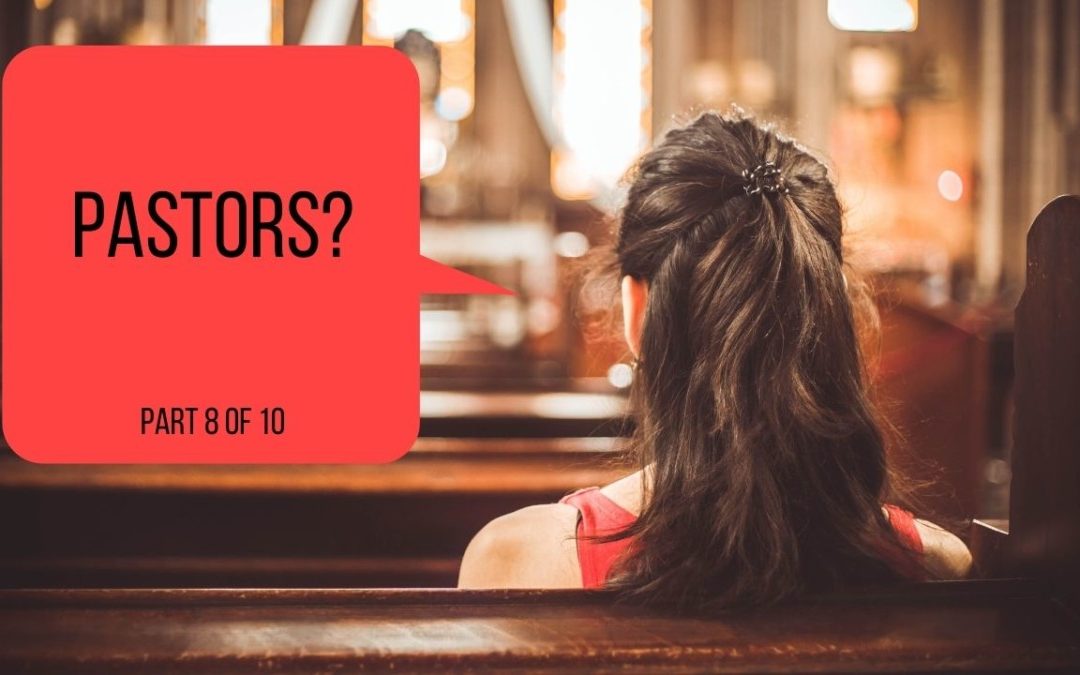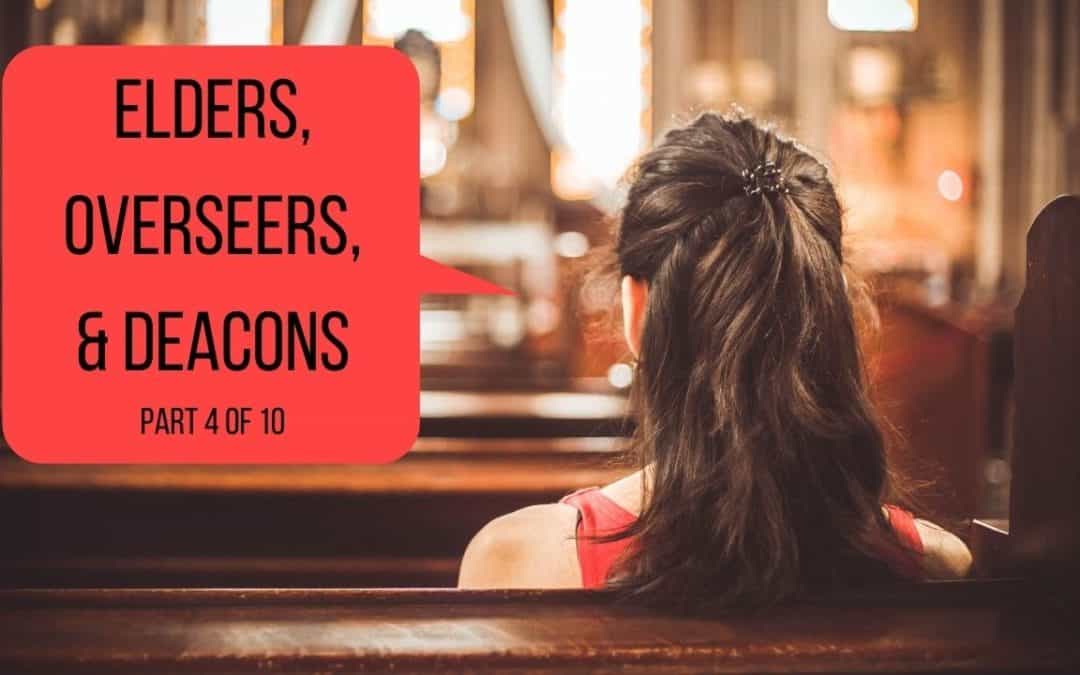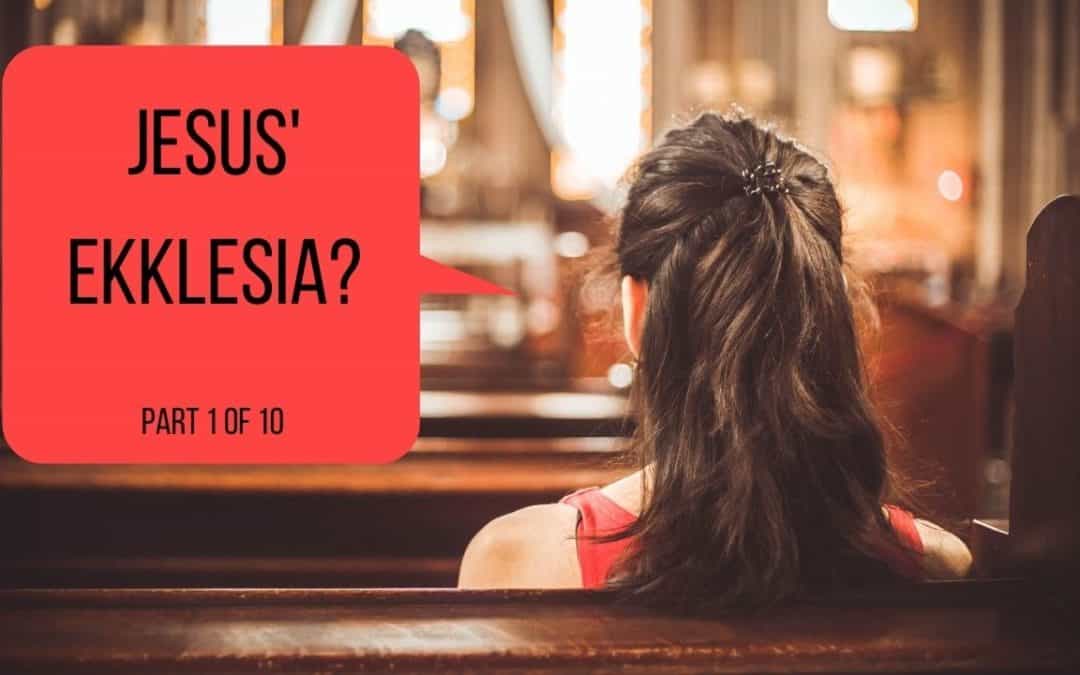
Pastors
Pastors
Who Can Pastor in the Church?
This blog is part eight of a ten-part series on the church. Today we will address the gift of pastors and pastoring. Once again, the big question many ask is, can a woman be a pastor? My answer is yes, and no! Please read to the end so what I have to say will not be misrepresented.
“Pastor” is Not Used Interchangeably with Elder/Overseer
As stated before, an elder and overseer can be used interchangeably. We must consider what is written and not try to make it say something it doesn’t. Elder/overseer is not used interchangeably with the word pastor. This is where the church today has confused roles or “offices” with gifts and ministries. (Acts 20:17, 28; Titus 1:5, 7)
4166 poimḗn – properly, a shepherd (“pastor” in Latin).
“Pastors” in Ephesians
Ephesians is the only place that the noun “pastor” is used. It is on the list along with apostles, prophets, evangelists, and teachers. If to read the context it says that these are gifts of Christ, repeating some of the Corinthian passage on gifts.
So, if to say that women cannot be “pastors” or shepherds in the church, you would have to say she cannot be an evangelist, prophet, or teacher either. Some actually do say this, but then you must conclude that the gifts of the spirit are not given to women.
A Gift & Ministry
Pastor is one of the spiritual gifts or ministries given to some of the members of the church. A man who is gifted (given the gift) of pastor, would be one likely to step up and possibly desire to be an elder. But he must also be gifted in leadership and teaching, and meet the other qualifications to serve in this way. All elders must be teachers and shepherds. But not all gifted to serve the church as a teacher or pastor/shepherd, are elders.
Teaching and pastoring are gifts and ministries. An elder/overseer is a position or office in a local church. Although the gifts of teaching and shepherding are also needed for that position. So, it is important to define what a pastor is since in today’s age most churches have made a pastor to mean what is biblically meant by elder/overseer. As a result, this suppresses those in the church who possess the gift of pastoring, but are not in the office of elder.
Women Pastors in the Church
A woman may have the gift of pastoring, but according to the qualifications of an elder/overseer, she should not hold that office. This is not saying in any way that she is less or her ministry is not valid or needed in the church. We must focus on what God has ordained us to do through His spirit and not worry about what He has not given us to do.
Those whom women are called to shepherd are most likely other women. They may need shepherding in a way that a male would not be unable to do, or it could be inappropriate for him to do. If women think this ministry is less important or not as valuable as pastoring as an elder, then they themselves are demeaning women and giving them less value.
Shepherding in 1 Peter 5:1-3
Many misuse 1 Peter 5:1-3 and try to equate pastor to mean elder. That is not what the verse says. In verse 2 it says, “Give a shepherd’s care to God’s flock among you,” (NET) or other translations say “pastor the church,” which may confuse some into thinking it says “pastoring” is a role or a position, an office or job in the church. It does not say that. The verse says to shepherd/pastor the flock/church. Just like other places, it says to exhort and to teach. Like I said before, an elder/overseer is required to have the gift of teaching and shepherding, as well as other gifts and ministries.
Yes, an elder is a pastor, a teacher, and possesses other gifts. That still does not mean that the word shepherd or pastor is interchangeable with the words elder or overseer. We do not see them grammatically used interchangeably in any verse.
Pastors in the Church
There can and should be other people functioning in the church with the gift of pastor, men and women alike, just not in the “elder” idea of pastor in today’s church, as overseer of the whole church. The elders/overseers should be pastoring those using their gift of pastor. Likewise, they should shepherd all those using every other gift given to the body. They will have to give an account one day to Jesus as to how they “ruled” their eklessia. Did they help keep unity in the church? Were they able to keep false teachers and teaching out of the church? Did they keep order when the church gathered?
Multiple Gifts & Ministries
It seems that people can be given multiple gifts since elders/overseers must have multiple gifts. Also, we are told that we can and should be eager for or desire those “greater” gifts. The people with the “greater” gifts are not greater in and of themselves but are greater because of the impact they can have on the spiritual growth of the church and increasing the future citizens in God’s Kingdom.
Pastoring and teaching are two examples of gifts and ministries that elders/overseers MUST possess, but others in the church are also given these gifts and ministries.
Cognate: 1320 didáskalos (a masculine noun derived from 1321 /didáskō, “to teach”) – a teacher, an instructor acknowledged for their mastery in their field of learning; in Scripture, a Bible teacher, competent in theology. See 1319 (didaskalia).
Teamwork
We are a team, leaders and those they lead, and need each other. As they say, if there is no one following, you are just going on a walk by yourself! And, if the church does not have leaders, chaos can happen and the Devil can be given a foothold.
We will be blessed by being a blessing and gain rewards for our service and our service in encouraging and supporting others who are serving.
“Whoever receives you receives me, and whoever receives me receives the one who sent me. Whoever receives a prophet in the name of a prophet will receive a prophet’s reward. Whoever receives a righteous person in the name of a righteous person will receive a righteous person’s reward. And whoever gives only a cup of cold water to one of these little ones in the name of a disciple, I tell you the truth, he will never lose his reward.” (Matthew 10:40-42)
Paul & Barnabas
One last thing to consider… Of course, sometimes people and ministries go different ways such as Paul and Barnabas did. But, if we stir up others against someone serving God and the saints in truth, or try to destroy the work that they are doing, we will answer to God because. In reality, it is His work being destroyed or spoken against.
This does not mean though we should not bring to light false teachers or teaching. We are commanded to do that for the well-being of the churches and the saints. This is one of the roles of elder/overseer, and not a pastor, in regards to the church as a whole.
Obviously, if you are pastoring or disciplining someone or a small group, you must shepherd and counsel them in truth. You must also show them any false teachings or ideas that they may have.
Men & Women Pastors
Men and women alike who have the gift of pastoring must seeks God’s direction as to whom He wants them to shepherd. There may be one flock or many within or outside the eklessia that need spiritual food, guidance, and protection from the world and false teachings. A shepherd can teach and counsel the person or people God directs them to. They do not need to be an elder to do this, and it is for their own good as well as others, that they are still under the authority of the local elders/overseers.
In part nine we will take a look at the manifestation of the gift of prophesying.
Until then, as always, I encourage you to seek truth, to love God, and to obey Jesus.
P.S.
In case there is any confusion in this blog or video (as one has said), in short, “pastor” is a gift and ministry given to the church, men and women alike. It should not be an “office or job.” It is not the same as elder/overseer OFFICE. Unfortunately the church today has made “pastor” to be an office, basically of elder. In that case, a woman should not fill that role. Elders are men.



Recent Comments